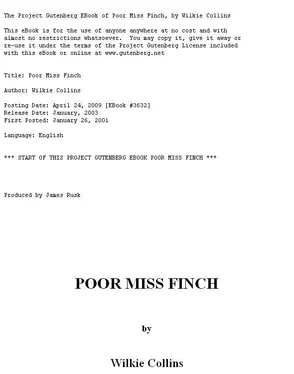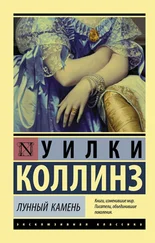Уилки Коллинз - Poor Miss Finch
Здесь есть возможность читать онлайн «Уилки Коллинз - Poor Miss Finch» весь текст электронной книги совершенно бесплатно (целиком полную версию без сокращений). В некоторых случаях можно слушать аудио, скачать через торрент в формате fb2 и присутствует краткое содержание. Год выпуска: 2002, Жанр: Классическая проза, на английском языке. Описание произведения, (предисловие) а так же отзывы посетителей доступны на портале библиотеки ЛибКат.
- Название:Poor Miss Finch
- Автор:
- Жанр:
- Год:2002
- ISBN:нет данных
- Рейтинг книги:3 / 5. Голосов: 1
-
Избранное:Добавить в избранное
- Отзывы:
-
Ваша оценка:
- 60
- 1
- 2
- 3
- 4
- 5
Poor Miss Finch: краткое содержание, описание и аннотация
Предлагаем к чтению аннотацию, описание, краткое содержание или предисловие (зависит от того, что написал сам автор книги «Poor Miss Finch»). Если вы не нашли необходимую информацию о книге — напишите в комментариях, мы постараемся отыскать её.
Poor Miss Finch — читать онлайн бесплатно полную книгу (весь текст) целиком
Ниже представлен текст книги, разбитый по страницам. Система сохранения места последней прочитанной страницы, позволяет с удобством читать онлайн бесплатно книгу «Poor Miss Finch», без необходимости каждый раз заново искать на чём Вы остановились. Поставьте закладку, и сможете в любой момент перейти на страницу, на которой закончили чтение.
Интервал:
Закладка:
We disbursed; we investigated; we secured our proof. It took a fortnight. At the end of that time, we had the necessary materials in hand for opening the eyes of good Papa.
In the course of the inquiry I was brought into contact with many strange people—among others, with a man who startled me, at our first interview, by presenting a personal deformity, which, with all my experience of the world, I now saw oddly enough for the first time.
The man's face, instead of exhibiting any of the usual shades of complexion, was hideously distinguished by a superhuman—I had almost said a devilish—colouring of livid blackish blue! He proved to be a most kind, intelligent, and serviceable person. But when we first confronted each other, his horrible color so startled me, that I could not repress a cry of alarm. He not only passed over my involuntary act of rudeness in the most indulgent manner—he explained to me the cause which had produced his peculiarity of complexion; so as to put me at my ease before we entered on the delicate private inquiry which had brought us together.
"I beg your pardon," said this unfortunate man, "for not having warned you of my disfigurement, before I entered the room. There are hundreds of people discolored as I am, in the various parts of the civilized world; and I supposed that you had met, in the course of your experience, with other examples of my case. The blue tinge in my complexion is produced by the effect on the blood of Nitrate of Silver—taken internally. It is the only medicine which relieves sufferers like me from an otherwise incurable malady. We have no alternative but to accept the consequences for the sake of the cure."
He did not mention what his malady had been; and I abstained, it is needless to say, from questioning him further. I got used to his disfigurement in the course of my relations with him; and I should no doubt have forgotten my blue man in attending to more absorbing matters of interest, if the effects of Nitrate of Silver as a medicine had not been once more unexpectedly forced on my attention, in another quarter, and under circumstances which surprised me in no ordinary degree.
Having saved Papa on the brink of—let us say, his twentieth precipice, it was next necessary to stay a few days longer and reconcile him to the hardship of being rescued in spite of himself. You would have been greatly shocked, if you had seen how he suffered. He gnashed his expensive teeth; he tore his beautifully manufactured hair. In the fervour of his emotions, I have no doubt he would have burst his new stays—if I had not taken them away, and sold them half-price, and made (to that small extent) a profit out of our calamity to set against the loss. Do what one may in the detestable system of modern society, the pivot on which it all turns is Money. Money, when you are saving Freedom! Money, when you are saving Papa! Is there no remedy for this? A word in your ear. Wait till the next revolution!
During the time of my absence, I had of course corresponded with Lucilla.
Her letters to me—very sad and very short—reported a melancholy state of things at Dimchurch. While I had been away, the dreadful epileptic seizures had attacked Oscar with increasing frequency and increasing severity. The moment I could see my way to getting back to England, I wrote to Lucilla to cheer her with the intimation of my return. Two days only before my departure from Paris, I received another letter from her. I was weak enough to be almost afraid to open it. Her writing to me again, when she knew that we should be re-united at such an early date, suggested that she must have some very startling news to communicate. My mind misgave me that it would prove to be news of the worst sort.
I summoned courage to open the envelope. Ah, what fools we are! For once that our presentments come right, they prove a hundred times to be wrong. Instead of distressing me, the letter delighted me. Our gloomy prospect was brightening at last.
Thus—feeling her way over the paper, in her large childish characters—Lucilla wrote:
"DEAREST FRIEND AND SISTER,—I cannot wait until we meet, to tell you my good news. The Brighton doctor has been dismissed; and a doctor from London has been tried instead. My dear! for intellect there is nothing like London. The new man sees, thinks, and makes up his mind on the spot. He has a way of his own of treating Oscar's case; and he answers for curing him of the horrible fits. There is news for you! Come back, and let us jump for joy together. How wrong I was to doubt the future! Never, never, never will I doubt it again. This is the longest letter I have ever written.
"Your affectionate,
"LUCILLA."
To this, a postscript was added, in Oscar's handwriting, as follows:—
"Lucilla has told you that there is some hope for me at last. What I write in this place is written without her knowledge—for your private ear only. Take the first opportunity you can find of coming to see me at Browndown, without allowing Lucilla to hear of it. I have a great favor to ask of you. My happiness depends on your granting it. You shall know what it is, when we meet.
"OSCAR."
This postscript puzzled me.
It was not in harmony with the implicit confidence which I had observed Oscar to place habitually in Lucilla. It jarred on my experience of his character, which presented him to me as the reverse of a reserved secretive man. His concealment of his identity, when he first came among us, had been a forced concealment—due entirely to his horror of being identified with the hero of the trial. In all the ordinary relations of life, he was open and unreserved to a fault. That he could have a secret to keep from Lucilla, and to confide to me, was something perfectly unintelligible to my mind. It highly excited my curiosity; it gave me a new reason for longing to get back.
I was able to make all my arrangements, and to bid adieu to my father and my sisters on the evening of the twenty-third. Early on the morning of the twenty-fourth, I left Paris, and reached Dimchurch in time for the final festivities in celebration of Christmas Eve.
The first hour of Christmas Day had struck on the clock in our own pretty sitting-room, before I could prevail upon Lucilla to let me rest, after my journey, in bed. She was now once more the joyous light-hearted creature of our happier time; and she had so much to say to me, that not even her father himself (on this occasion) could have talked her down. The next morning she paid the penalty of exciting herself over-night. When I went into her room, she was suffering from a nervous head-ache, and was not able to rise at her usual hour. She proposed of her own accord that I should go alone to Browndown to see Oscar on my return. It is only doing common justice to myself to say that this was a relief to me. If she had had the use of her eyes, my conscience would have been easy enough—but I shrank from deceiving my dear blind girl, even in the slightest things.
So, with Lucilla's knowledge and approval, I went to Oscar alone.
I found him fretful and anxious—ready to flame out into one of his sudden passions, on the smallest provocation. Not the slightest reflection of Lucilla's recovered cheerfulness appeared in Lucilla's lover.
"Has she said anything to you about the new doctor?" were the first words he addressed to me.
"She has told me that she feels the greatest faith in him," I answered. "She firmly believes that he speaks the truth in saying he can cure you."
"Did she show any curiosity to know how he is curing me?"
"Not the slightest curiosity that I could see. It is enough for her that you are to be cured. The rest she leaves to the doctor."
My last answer appeared to relieve him. He sighed, and leaned back in his chair. "That's right!" he said to himself. "I'm glad to hear that."
Читать дальшеИнтервал:
Закладка:
Похожие книги на «Poor Miss Finch»
Представляем Вашему вниманию похожие книги на «Poor Miss Finch» списком для выбора. Мы отобрали схожую по названию и смыслу литературу в надежде предоставить читателям больше вариантов отыскать новые, интересные, ещё непрочитанные произведения.
Обсуждение, отзывы о книге «Poor Miss Finch» и просто собственные мнения читателей. Оставьте ваши комментарии, напишите, что Вы думаете о произведении, его смысле или главных героях. Укажите что конкретно понравилось, а что нет, и почему Вы так считаете.






